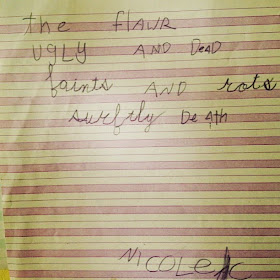The
following is a (mostly) verbatim transcription of my response to a question on
the “Exit Survey for the Department of English MFA Program,” which is sent to
graduate students upon completion of their degrees. At the time of its writing,
I mistakenly believed that this was an anonymous survey, despite the fact that the
first page of this form explicitly asked for my name, mailing address, phone
number, permanent email address, and the identities of my committee members. I
tell you this not to flaunt my ignorance nor to prove the limitations of my feeble
memory, but to testify to my honest intentions and good will when generating
this response; for, as the ever-quotable Oscar Wilde once opined, “Man is least himself when he talks
in his own person. Give him a mask, and he will tell you the truth."
This
post is for you, future MFA’s.
From
the section entitled, “As an Alum”:
3)
What advice would you give to a student entering the MFA Program?
·
Get familiar with Duotrope, and other platforms that help to
introduce you to the wide array of publications that exist. The publishing
world is too difficult to navigate alone, and those that publish (even small
things in even smaller publications) are happier with their time in the
program.
·
Read Khristian Mecom’s post (on
the MFA blog) about publishing.
·
Host your own private readings
and writing exchanges, a la the esteemed Coastlines Editor-in-Chief (’13-’14)
Ben Parham.
·
If you are afraid of teaching and
large crowds, or overwhelmed by the prospect of taking on the added work of a GTA-ship
in your first semester, then apply to work at the University Center for
Excellence in Writing. It will gently expose you to the teaching and tutoring
experience, as well as acquaint you with a selection of writing assignments and
prompts that may encourage you to teach your own class in the future.
·
If the GTA experience is taking
away too much from your writing, or contributing to poor health, do not be
afraid to take a year off and work elsewhere (another department, another field),
especially if your ultimate goal is not to teach. My decision not to teach was a difficult one, but it
was directly responsible for the greatest breakthroughs in my writing.
·
Alternatively, even if you are
positive that you do not want to teach, I’d recommend stepping out of your
comfort zone and trying it out for a year.
·
Some of the biggest literary
influences on my writing came from the books, philosophies, and principles I
encountered in my Lit classes. Do not underestimate the value of the Lit classes,
and do not grumble about taking them. Remember: most, if not all, of the best
authors were literary critics, philosophers, philologists, and/or delighted in
speaking intelligently about the works of others.
·
Be sure to take classes that will
push you as both a creative and academic writer, and do not be so certain that
there is a distinct difference between the two. Think critically about what you
can use from your Lit classes in your poems, stories, or essays, and do not be
afraid to emulate the canonical (and, oftentimes, outdated) writers that you
read.
·
Experiment, experiment,
experiment. Use the workshop as an opportunity to experiment with voice,
structure, genre, and tone, and not just to strut your stuff. This approach
will not only take pressure off of you, but it will inspire your peers to take
greater risks.
·
Be a kind but honest workshop
peer. Workshops are based on a gift-giving economy. You’ll get what you give. Usually.
·
Becka McKay once said, “Your
writing has a job to do.” If you aren’t actively working on it, then send it
out for publication. Make a game out of rejection. But don’t let all of those files
on your computer just sit there, doing nothing.
·
Don’t be afraid to be
sentimental. Forget (or, at least challenge) the writing rules that you learned
as a high school student and as an undergrad. There are no absolutes in
writing. Even clichés can be used well. Just write what delights (or
devastates) you.
·
In my opinion, the only thing you
want to avoid is writing a piece that sounds like it was written solely for the
workshop.
Mikaela von Kursell is an MFA candidate specializing in
Fiction. She will officially receive a much-anticipated, though undoubtedly
fake, copy of her diploma when she attends her graduation ceremony on Friday,
May 2, 2014 . Her thesis, “The Animalcules of Adam: & Other Small Tales,”
is a genre-bending short story collection which explores the lives of important
historical figures such as Antoni van Leeuwenhoek, the purported father of
microbiology, and Robert Cawdrey, the compiler of the first English dictionary.
She lives in South Florida with her blind and deaf Cocker Spaniel, Lady, the
noblest little animalcule she knows.
